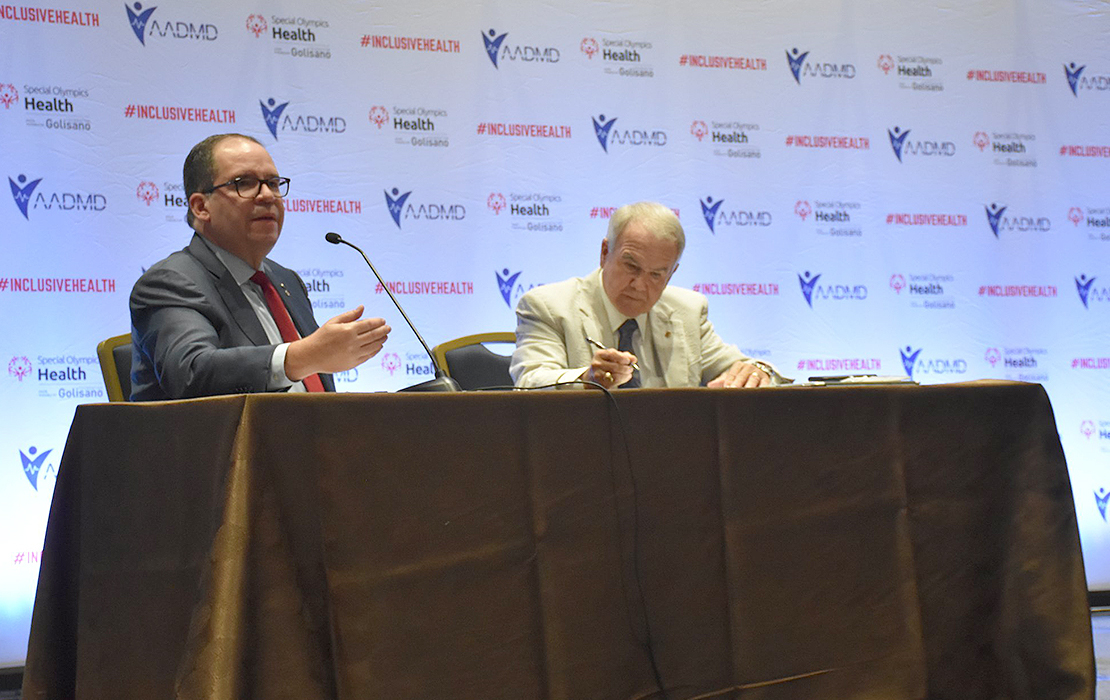ADA demonstrates commitment to improving dental care for patients with disabilities
President participates in One Voice for Inclusive Health Conference

The American Dental Association is taking steps to help dentists better care for patients with intellectual and developmental disabilities, including by collaborating with the American Academy of Developmental Medicine & Dentistry and the American Medical Association.
For the first time in history, the presidents of the ADA and AMA met to discuss long-standing health inequities for people with disabilities during the One Voice for Inclusive Health Conference held June 6 by the American Academy of Developmental Medicine & Dentistry, a nonprofit organization made up of health professionals, including dentists, committed to improving the quality of health care for people with intellectual and developmental disabilities.
"It was an honor to represent the American Dental Association at the American Academy of Developmental Medicine & Dentistry's One Voice Conference," said ADA President Cesar R. Sabates, D.D.S. "Collaboration across the health care profession is vital for helping individuals with intellectual and developmental disabilities achieve optimal health. This year's conference — which included my conversation with American Medical Association President Gerald Harmon, M.D. — offered many insights on a path forward in addressing the needs of this community. I commend the academy for its ongoing work in this area, and I look forward to future opportunities for leaders from all health care disciplines, including dentistry, to unite with one voice for inclusive health."
Drs. Sabates and Harmon participated in a fireside chat, during which they acknowledged the historical shortcomings of dentists and physicians who were under educated, ill-equipped and unwilling to treat people with disabilities. The presidents renewed their commitment to address this national disparity of care and outlined plans to provide clinical competency training to both dental and medical students.
"The work is not over. AADMD looks forward to continued conversation and commitment from the AMA and ADA and will hold both organizations to their promise," said Allen Wong, D.D.S., Ed.D., president of the American Academy of Developmental Medicine & Dentistry and global clinical adviser for the Special Olympics' Special Smiles program, which provides oral health care information and screenings to participating athletes.
At the ADA, the Council on Advocacy for Access and Prevention has organized multiple webinars to help support dentists as they treat patients with disabilities.
In September 2021, the Achieving Optimal Oral Health webinar series saw more than 1,000 registrants. Three of the four webinars are available on demand for free at ebusiness.ADA.org: Caregivers and Families Preventing Oral Diseases for Patients Who Have Special Health Care Needs, Making the Dental Office More Inclusive for Patients Who Have Special Health Care Needs, and Educating Future Dental Professionals to Optimally Treat Patients Who Have Special Health Care Needs.
The Council on Advocacy for Access and Prevention also offered a webinar in November 2021 titled A Family Affair: Caregiving, Oral Health and Health Literacy Considerations Across the Lifespan , which had about 300 participants. It is available on demand for free at ebusiness.ADA.org. The council is planning a collaborative webinar with the Special Care Dentistry Association for this fall as well. One segment, titled Are You Seizure Smart?, will focus on epilepsy.
In response to a resolution passed in 2021 by the ADA House of Delegates on oral health equity, the council is also developing a health equity toolkit that will address barriers to care for patients with disabilities. The council and Association have participated in health equity discussions with the AMA to review strategies for engaging members and staff around this issue as well.



